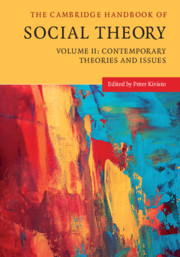Book contents
- The Cambridge Handbook of Social Theory
- The Cambridge Handbook of Social Theory
- Copyright page
- Contents
- Figures
- Tables
- Contributors
- Preface
- 1 Rational Choice Theory and Methodological Individualism
- 2 Network Theories
- 3 Cultural Sociology
- 4 Identity
- 5 Emotions Theory
- 6 Theorizing Sex/Gender: Feminist Social Theory
- 7 Intersectionality as Critical Social Theory
- 8 Modernity
- 9 Realism
- 10 Globalization: Not Good, Bad, or Over
- 11 Time/Space
- 12 Social Theory in the Anthropocene: Ecological Crisis and Renewal
- 13 Embodiment
- 14 Sexualities
- 15 Multiculturalism
- 16 Risk
- 17 Trust and the Variety of Its Bases
- 18 Unities Within Conflict: Mapping Biology’s Relevance to Sociological Theory
- 19 Civil Society
- 20 Social Movements: Sequences vs Fuzzy Temporality
- 21 Immigration
- Index
- References
8 - Modernity
Published online by Cambridge University Press: 03 December 2020
- The Cambridge Handbook of Social Theory
- The Cambridge Handbook of Social Theory
- Copyright page
- Contents
- Figures
- Tables
- Contributors
- Preface
- 1 Rational Choice Theory and Methodological Individualism
- 2 Network Theories
- 3 Cultural Sociology
- 4 Identity
- 5 Emotions Theory
- 6 Theorizing Sex/Gender: Feminist Social Theory
- 7 Intersectionality as Critical Social Theory
- 8 Modernity
- 9 Realism
- 10 Globalization: Not Good, Bad, or Over
- 11 Time/Space
- 12 Social Theory in the Anthropocene: Ecological Crisis and Renewal
- 13 Embodiment
- 14 Sexualities
- 15 Multiculturalism
- 16 Risk
- 17 Trust and the Variety of Its Bases
- 18 Unities Within Conflict: Mapping Biology’s Relevance to Sociological Theory
- 19 Civil Society
- 20 Social Movements: Sequences vs Fuzzy Temporality
- 21 Immigration
- Index
- References
Summary
Within social theory, the term ‘modernity’ is most often used to refer to societies that are built on the principles of individual freedom and instrumental mastery.Furthermore, such societies are assumed to have emerged in Western Europe and North America from the late eighteenth century onwards.All debate notwithstanding, this has remained the core understanding of modernity. Even critical positions, including de/postcolonial ones, have been developed against a backdrop of some such notion of modernity.The objective of this essay is neither to merely portray the rich debate nor to add a further nuance to the positions advanced.Rather, by contextualizing the existing debates, it aims to widen the horizon on thinking about modernity.
Autonomy, freedom, global history, individual, instrumental reason, modernity
Peter Wagner is Research Professor of Social Sciences at the Catalan Institute for Research and Advanced Societies (ICREA) and at the University of Barcelona, as well as project director at Ural Federal University, Ekaterinburg. His research aims to combine globally oriented historical-comparative sociology with conceptual concerns in social theory and political philosophy.His recent books include: Collective Action and Political Transformations: The Entangled Experiences in Brazil, South Africa, and Europe (with Aurea Mota, 2019); European Modernity: A Global Approach (with Bo Stråth, 2017); and Progress: A Reconstruction (2016).
- Type
- Chapter
- Information
- The Cambridge Handbook of Social Theory , pp. 143 - 162Publisher: Cambridge University PressPrint publication year: 2020
References
- 1
- Cited by



